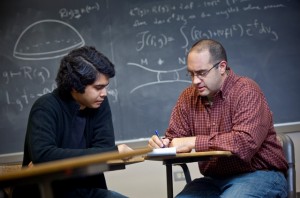The National Science Foundation (NSF) has awarded Justin Corvino, associate professor of mathematics, a $149,052 grant to continue his research on geometric analysis problems inspired by Einstein’s theory of gravitation (general relativity).

Farhan Abedin ’11 works with and Justin Corvino, associate professor of mathematics.
The Research at Undergraduate Institutions (RUI) grant will fund his research and travel, as well as that of participating students, through 2015. There are few RUI grants awarded in the areas of geometric analysis and topology, and Corvino believes that the strength of Lafayette’s undergraduate research program had a significant impact on his success in securing the grant.
“It speaks to the quality of Lafayette undergraduates—the EXCEL students that I’ve worked with in the past including Haotian Wu ’07, Shelvean Kapita ’10, and Farhan Abedin ’11—as well as the NSF-sponsored Research Experience for Undergraduates [an intensive, eight-week summer research experience] students,” says Corvino. “The success of my proposal was in part due to the success I have had in mentoring all these students.”
All of the students Corvino has mentored have gone on to graduate programs in various areas of mathematics. Although Wu had begun graduate school at the University of Texas-Austin just before Abedin arrived at Lafayette, he co-authored a paper with Abedin, Kapita, and Corvino published in Journal of Geometry and Physics. Abedin and Wu joined Corvino in attending the PRIMA Conference on Geometric Analysis at the Pacific Institute for Mathematical Science at University of British Columbia in Vancouver in 2010, as well as the Beijing Summer Workshop in Mathematical Relativity at Peking University in China.
With the new grant, Corvino again plans to include students in his work through the EXCEL Scholars program. Most of them will work during the summers and possibly complete follow-up work during January interim sessions.
Corvino is planning on bringing one or more EXCEL Scholars supported by the grant to the Park City Math Institute held in Park City, Utah, next summer. The institute is a three-week program that brings together faculty researchers, post-doctoral researchers, graduate students, undergraduates, and high school teachers for various programs. Corvino will lead the Undergraduate Faculty Program, working with faculty from other undergraduate institutions to discuss advanced coursework and research in geometric analysis.
To work with Corvino, students need to learn some advanced geometry topics before delving into the research. The project is, in many ways, a continuation of work Corvino began with a previous $114,000 NSF grant. Some new projects grew out of that research, while another line of research in the grant proposal involves the study of an optimization problem in symplectic geometry, which is a sub-field of geometry with connections to classical mechanics.
As Corvino explains, there are analogues of natural problems in geometry that relate to general relativity. “Problems that are accessible to students include problems about constant mean curvature and isoperimetric surfaces in geometries different than Euclidean space,” he says. “The isoperimetric problem is the problem of enclosing a specified amount of volume by a surface with least possible area. In Euclidean geometry, the solution of this problem is a round sphere. In the context of general relativity, isoperimetric spheres arise in the study of mass and center of mass of isolated gravitational systems.”
“It’s great to work with students who share interests in both math and physics. I enjoy seeing them progress to being able to tackle more advanced texts and research papers, and to be able to get some semblance of what research in mathematics is like,” he says. “I want students to have as much information available to them as possible when they apply to graduate school and pick an area of research.”
This summer, Corvino co-organized a summer graduate workshop with Pengzi Miao, associate professor of mathematics at University of Miami, at the Mathematical Sciences Research Institute in Berkeley, Calif. The workshop was a warm-up for next fall’s semester-long Mathematical Sciences Research Institute program, Mathematical General Relativity, in which Corvino will participate.
Corvino previously received a Simons Collaboration Grant, which supported his travel to various conferences and workshops, including to the International Centre for Theoretical Physics in Trieste, Italy, and the Mathematisches Forschungsinstitut Oberwolfach in Germany. The grant also supported speakers at Lafayette, including the L^2 Geometry-Topology Seminar.
In 2008, Corvino received a Fulbright Fellowship to conduct geometric analysis research at the Mittag-Leffler Institute and the Royal Institute of Technology (KTH) in Stockholm, Sweden. Corvino earned Ph.D. and master’s degrees from Stanford University and is a past recipient of Lafayette’s Thomas Roy and Lura Forest Jones Lecture Award.
